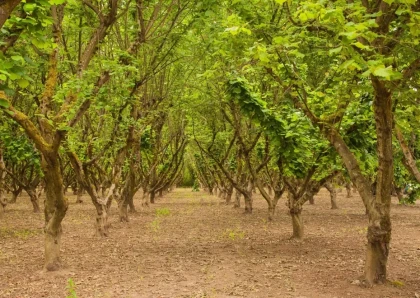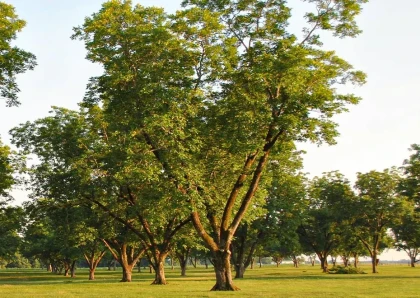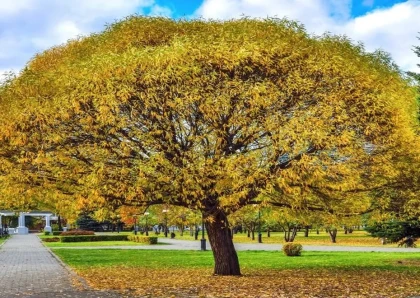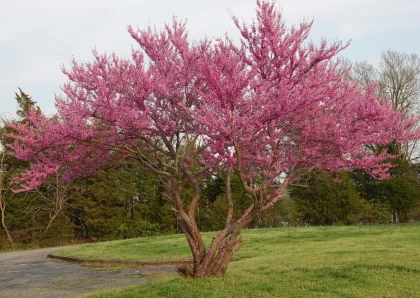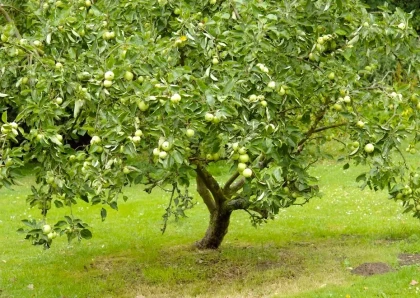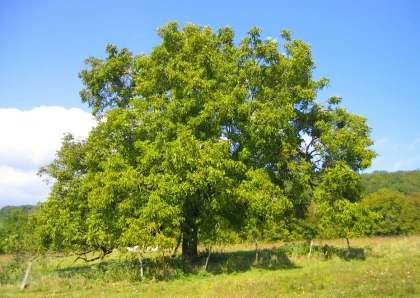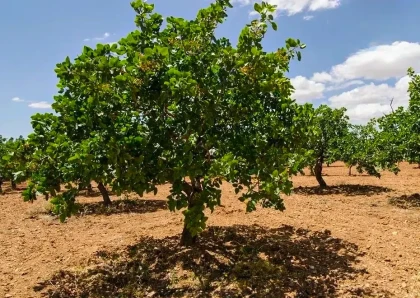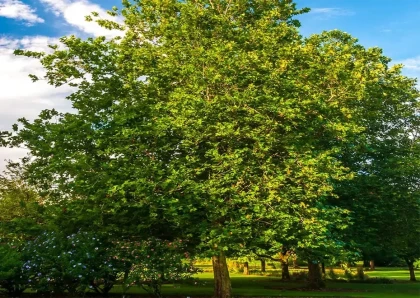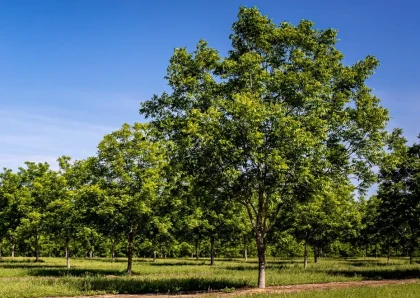
Anjou Pear Tree
Overview
History of the Tree
The Anjou Pear Tree, also known as Pyrus communis 'Anjou,' has a rich history that can be traced back to the mid-19th century. It is believed to have originated in the Anjou region of France, from which it derived its name. The Anjou pear gained popularity due to its exceptional flavor and versatility, making it one of the most widely cultivated pear varieties around the world.
Detailed Description of the Tree
The Anjou Pear Tree is a medium-sized deciduous tree that typically grows to a height of 15 to 20 feet (4.5 to 6 meters) with a spread of 10 to 15 feet (3 to 4.5 meters). It has an upright growth habit and a dense, rounded canopy. The tree produces beautiful clusters of white flowers in spring, which give way to medium to large-sized pears. The Anjou pear is characterized by its smooth greenish-yellow skin and juicy, creamy white flesh. The pears have a sweet, mild flavor with a hint of citrus and a buttery texture.
Types of This Tree
The Anjou Pear Tree is a specific cultivar within the Pyrus communis species. While there are no distinct types of Anjou pears, there are different varieties of pears that offer variations in flavor, size, and color. Some popular pear varieties include Bartlett, Bosc, Comice, and Conference, each with its own unique characteristics.
Importance of This Tree
The Anjou Pear Tree holds several important qualities:
- Delicious Flavor: The Anjou pear is highly regarded for its sweet and juicy flavor, making it a favorite for fresh eating, baking, and cooking.
- Versatility in the Kitchen: The Anjou pear's crisp texture and delicate flavor make it suitable for various culinary uses, including salads, desserts, preserves, and even pear cider.
- Long Shelf Life: Anjou pears have the advantage of a long shelf life, allowing for extended storage and enjoyment, making them widely available throughout the year.
How to Care for This Tree
To ensure the healthy growth of the Anjou Pear Tree, consider the following care guidelines:
- Plant the tree in a location that receives full sunlight and well-drained soil. Anjou pears prefer loamy, fertile soil.
- Water the tree regularly, especially during dry periods, to keep the soil evenly moist. Avoid overwatering, as excessive moisture can lead to root rot.
- Apply a layer of organic mulch around the base of the tree, but keep it away from the trunk to prevent rot and pest issues. Mulch helps retain moisture, suppress weeds, and regulate soil temperature.
- Prune the tree during the dormant season to shape it, remove dead or diseased branches, and promote better airflow and light penetration within the canopy.
- Fertilize the tree in early spring with a balanced, slow-release fertilizer specifically formulated for fruit trees.
Benefits of the Tree
The Anjou Pear Tree offers several benefits:
- Flavorful Fruit: The pears of the Anjou variety are known for their delicious taste and smooth texture, making them a desirable fruit for both fresh consumption and culinary uses.
- Abundant Harvest: Anjou pear trees are productive and can yield a generous amount of fruit, providing an ample supply for personal consumption and sharing.
- Ornamental Appeal: In addition to its fruit-bearing capabilities, the Anjou Pear Tree displays beautiful clusters of white flowers in spring, adding aesthetic value to landscapes and gardens.
How to Plant This Tree
Follow these steps to successfully plant an Anjou Pear Tree:
- Choose a planting location that provides full sunlight and well-drained soil.
- Dig a hole that is wider and slightly deeper than the root ball.
- Place the tree in the hole, ensuring the root ball is level with or slightly above the ground surface.
- Backfill the hole with soil, gently firming it around the roots to eliminate air pockets.
- Water the tree thoroughly after planting and continue to water regularly, especially during the first year to aid in establishment.
Different Types of Wood Products That Can Be Made From
The wood of the Anjou Pear Tree, like other pear varieties, is known for its fine grain and attractive color. While pear wood is not commonly used for large-scale woodworking, it is valued for its beautiful appearance and suitability for small crafts, such as carving, turning, and inlays. Pear wood is also favored by instrument makers for its acoustic properties and is used in the construction of musical instruments, including guitars, violins, and woodwind instruments.
Cons
While the Anjou Pear Tree is highly regarded, there are a few considerations to keep in mind:
- Pollination Requirement: Anjou pears are not self-pollinating, so it is necessary to plant another compatible pear variety nearby to ensure cross-pollination and fruit set.
- Disease Susceptibility: Anjou pears can be susceptible to certain diseases, such as fire blight and pear scab. Regular monitoring and appropriate preventive measures, such as proper sanitation and the use of disease-resistant varieties, can help minimize these risks.
FAQs
1. When is the best time to harvest Anjou pears?
Anjou pears are typically harvested when they reach maturity but are still firm. Harvesting is usually done in late summer or early autumn, depending on the specific growing region. Pears can be ripened off the tree by storing them at room temperature until they reach the desired ripeness.
2. Can Anjou pears be grown in containers?
While Anjou pear trees can be grown in containers, they require sufficient space for their root system and canopy. Select a large container with good drainage, use well-draining soil, and provide adequate water and nutrients to support their growth.
3. How long does it take for Anjou pear trees to bear fruit?
Anjou pear trees typically start bearing fruit within 3 to 5 years after planting, depending on growing conditions and the age of the tree at the time of purchase. However, full fruit production may take a few more years to establish.
No listings available
Related Products
Questions & Answers
What do you want to know about this product?
Reviews (5)
ForestryFoodie1
A Fruitful Delight
The Anjou Pear Tree in my orchard has been a joy. The juicy, sweet pears are perfect for fresh eating and baking. Highly recommended!
GardenGuru89
Perfect Pear Tree for Home Gardens
The Anjou Pear Tree is a must-have for any home garden. It's easy to care for and produces an abundant harvest of delicious pears
FruitEnthusiast23
A Tasty Treasure
I've tasted many pear varieties, but the Anjou Pear Tree stands out. Its sweet and buttery flavor is unmatched. Truly a culinary gem!
TreeLover345
Reliable and Delicious
The Anjou Pear Tree in my backyard has been a consistent producer of flavorful pears year after year. A reliable choice for any fruit lover!
Pomologist99
Delightful Anjou Pear Tree
The Anjou Pear Tree exceeds expectations with its exceptional taste and texture. It's a classic variety that never disappoints.





